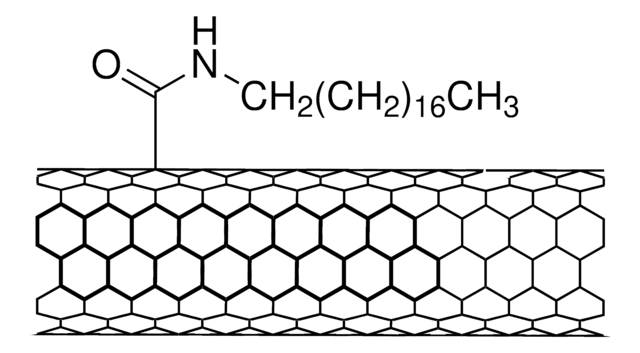698695
Carbon nanotube, single-walled
>70 wt. % carbon basis, D × L 2-10 nm × 1-5 μm , bundle dimensions, avg. no. of layers, 1
Sinónimos:
SWCNT
About This Item
Productos recomendados
assay
>70% carbon basis (wt.)
feature
avg. no. of layers 1
composition
carbon, ≥70%
D × L
2-10 nm × 1-5 μm , bundle dimensions
size
1.3-1.5 nm , individual SWNT diameter
mp
3652-3697 °C (lit.)
density
1.7-1.9 g/cm3 at 25 °C (lit.)
SMILES string
[C]
¿Está buscando productos similares? Visita Guía de comparación de productos
Application
Preparation Note
Analysis Note
Storage Class
11 - Combustible Solids
wgk_germany
WGK 3
flash_point_f
Not applicable
flash_point_c
Not applicable
ppe
dust mask type N95 (US), Eyeshields, Gloves
Elija entre una de las versiones más recientes:
¿Ya tiene este producto?
Encuentre la documentación para los productos que ha comprado recientemente en la Biblioteca de documentos.
Los clientes también vieron
Polymeric Nanocomposites for Bone Tissue Engineering
carbon nanotube buckypaper-modified electrodes
Artículos
Carbon nanotubes are materials that possess remarkable properties and offer extraordinary possibilities.
Carbon nanomaterials (CNMs), such as single-walled carbon nanotubes (SWCNTs), multi-walled carbon nanotubes (MWCNTs), and graphene (Figure 1), have diverse commercial applications including lighter and stronger composite materials, improved energy storage devices, more sensitive sensors, and smaller transistors.
Carbon nanotubes (CNTs) have received much attention since their discovery in 1991 by Sumio lijima1 due to their excellent mechanical, electrical, and optical properties.
A nanocomposite is typically defined as a mixture between a host material (e.g., polymer matrix) and nanofillers with at least one dimension of less than 100 nm.
Protocolos
Single-Walled Carbon Nanotubes: Exfoliation and Debundling Procedure
Single-Walled Carbon Nanotubes synthesized by the Super-Growth Method & their properties & applications, including dispersing SGCNTs, SGCNT-polymer composites & SGCNT-metal composites are discussed.
Nuestro equipo de científicos tiene experiencia en todas las áreas de investigación: Ciencias de la vida, Ciencia de los materiales, Síntesis química, Cromatografía, Analítica y muchas otras.
Póngase en contacto con el Servicio técnico




